江西省上饶市横峰县2016_2017学年高一英语下学期第一次月考试题
高中英语真题:2016-2017学年高一下学期英语第一次月考试卷

2016-2017学年高一下学期英语第一次月考试卷注意事项:本试卷分第I卷(选择题)和第II卷(非选择题)两部分。
本试卷分第I卷(选择题)和第II卷(非选择题)满分150分,考试时间120分钟。
第I卷第一部分听力(共两节,满分20分)第一节(共5小题;每小题1分,满分5分)听下面5段对话。
每段对话后有一个小题,从题中所给的A、B、C三个选项中选出最佳选项,每段对话仅读一遍。
1. Whose iPad will the woman borrow?A. John’s.B. Adam’s.C. Michael’s.2. What does the man have to do first?A. Clean his room.B. Buy movie tickets.C. Borrow some m oney from his friends.3. Where can the woman find the butter?A. In row10.B. Behind the speakers.C. In the middle ofthe store.4. What will the woman drink?A. A cup of coffee.B. A glass of water.C. Some orange juic e.5. What does the woman suggest the man do?A. Look at his cards.B. Put his cards down.C. Use differen t cards.第二节(共15小题;每小题1分,满分15分)听下面5段对话或独白。
每段对话或独白后有几个小题,从题中所给的A、B、C三个选项中选出最佳选项,并标在试卷的相应位置。
每段对话或独白读两遍。
听第6段材料,回答第6、7题。
6. How is Maria related to the girl?A. Her roommate.B. Her classmate.C. Her math teacher.7. What does the man think of Maria?A. She is lazy.B. She is intelligent.C. She isn’t a good p erson.听第7段材料,回答第8、9题。
高中英语真题:2016-2017学年高一英语下学期第一次月考试题(无答案)_6
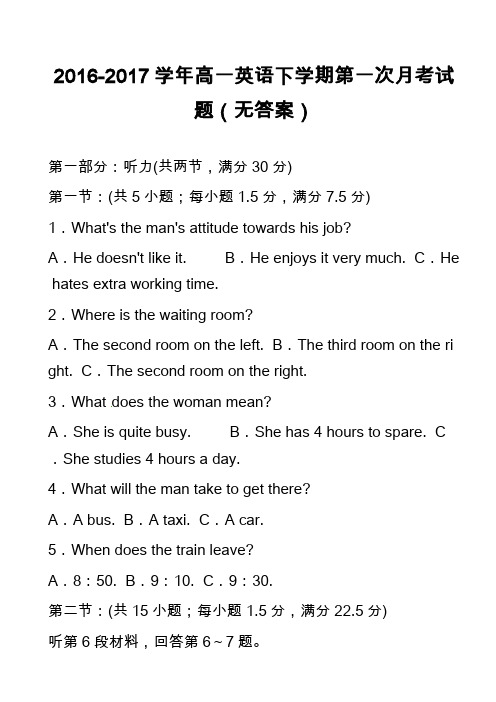
2016-2017学年高一英语下学期第一次月考试题(无答案)第一部分:听力(共两节,满分30分)第一节:(共5小题;每小题1.5分,满分7.5分)1.What's the man's attitude towards his job?A.He doesn't like it. B.He enjoys it very much. C.He hates extra working time.2.Where is the waiting room?A.The second room on the left. B.The third room on the ri ght. C.The second room on the right.3.What does the woman mean?A.She is quite busy. B.She has 4 hours to spare. C .She studies 4 hours a day.4.What will the man take to get there?A.A bus. B.A taxi. C.A car.5.When does the train leave?A.8:50. B.9:10. C.9:30.第二节:(共15小题;每小题1.5分,满分22.5分)听第6段材料,回答第6~7题。
6.What will they do tonight?A.Watch a film. B.Go to a concert. C.Attend a party. 7.Where will they meet?A.At the school gate. B.At the man's home. C.At the co ncert.听第7段材料,回答第8~9题。
8.What's wrong with the food?A.It isn't fresh. B.It looks terrible. C.It has been replaced .9.What does the woman do at last?A.She returns her fish. B.She refuses the steak. C.She orders something else.听第8段材料,回答第10~12题。
2017学年高一下学期第一次月考英语试题含答案
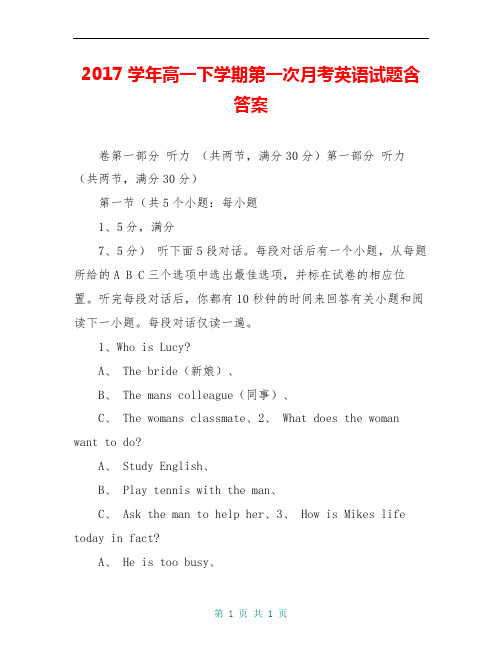
2017学年高一下学期第一次月考英语试题含答案卷第一部分听力(共两节,满分30分)第一部分听力(共两节,满分30分)第一节(共5个小题:每小题1、5分,满分7、5分)听下面5段对话。
每段对话后有一个小题,从每题所给的A B C三个选项中选出最佳选项,并标在试卷的相应位置。
听完每段对话后,你都有10秒钟的时间来回答有关小题和阅读下一小题。
每段对话仅读一遍。
1、Who is Lucy?A、 The bride(新娘)、B、 The mans colleague(同事)、C、 The womans classmate、2、 What does the woman want to do?A、 Study English、B、 Play tennis with the man、C、 Ask the man to help her、3、 How is Mikes life today in fact?A、 He is too busy、B、 He isnt busy at all、C、 He works and rests well、4、 What is the most probable relationship between the speakers?A、 Mother and son、B、 Boss and clerk、C、 Teacher and student、5、 What will the man do first after school?A、 Go home、B、 Do an experiment、C、 Go to the library、第二节(共15小题:每小题1、5分,满分22、5分)听下面5段对话或对白,每段对话或对白后有几个小题,从题中所给的A、B、C三个选项中选出最佳选项,并标在试卷的相应位置,听每段对话或独白前,你将有时间阅读各个小题。
每小题5秒钟;听完后,各小题给出5秒钟的作答时间。
江西省上饶市横峰中学高一英语下学期3月第一次月考试题

学习资料江西省上饶市横峰中学高一英语下学期3月第一次月考试题江西省上饶市横峰中学2020—2021学年高一英语下学期3月第一次月考试题满分为150分考试时间120分钟出卷人:审卷人:第一节(共5小题;每小题1。
5分,满分7。
5分)听下面5段对话.每段对话后有一个小题,从题中所给的A、B、C三个选项中选出最佳选项,并标在试卷的相应位置.听完每段对话后,你都有10秒钟的时间来回答有关小题和阅读下一小题。
每段对话仅读一遍.1。
How does the man feel now?A。
Proud. B. Angry. C. Disappointed.2。
What time is it now?A。
10:45。
B。
11:15. C.11:45。
3.What size does the woman want?A. Size 8。
B. Size 10。
C. Size 12.4。
What might be the relationship between the speakers?A. Mother and son.B. Brother and sister.C. Father and daughter。
5。
What does the woman like best?A. The apple cake. B。
The banana bread。
C. The chocolate cookie.第二节(共15小题;每小题1.5分,满分22.5分)听下面5段对话或独白。
每段对话或独白后有几个小题,从题中所给的A、B、C三个选项中选出最佳选项,并标在试卷的相应位置。
听每段对话或独白前,你将有时间阅读各个小题,每小题5秒钟;听完后,各小题将给出5秒钟的作答时间。
每段对话或独白读两遍。
听第6段材料,回答第6、7题.6.Who said the woman looked like a bear?A. The man.B. Mark。
精选江西省上饶县2016_2017学年高一英语下学期第一次月考试题

江西省上饶县2016-2017学年高一英语下学期第一次月考试题第Ⅰ卷(三部分,共115分)第一部分:听力(共两节, 满分30分)第一节(共5小题;每小题1.5分, 满分7.5分)听下面5段对话。
每段对话后有一个小题, 从题中所给的A、B、C三个选项中选出最佳选项, 并标在试卷的相应位置。
听完每段对话后, 你都有10秒钟的时间来回答有关小题和阅读下一小题。
每段对话仅读一遍。
第一节(共5小题;每小题1.5分,满分7.5分)请听下面5段对话,选出最佳选项。
1. What does the man want a robot for?A. Looking after his younger brother.B Helping his mother with housework.C. Playing with him in his free time.2. Who has a robot?A. The man.B. The man’s sister.C. The woman’s sister.3. How does the man feel about the woman?A. She is careless with money.B. She has a good taste in clothing.C. She is able to make money.4. What does the man wish the robot could do?A. Sing.B. Dance.C. Play chess.5. What are the speakers talking about?A. The ma n’s mistake.B. The man’s behavior.C. The man’s job interview.第二节(共15 小题,每小题1.5分,满分22.5分)请听下面5段对话或独白,选出最佳选项。
2016-2017学年高一英语下学期第一次月考试题_2
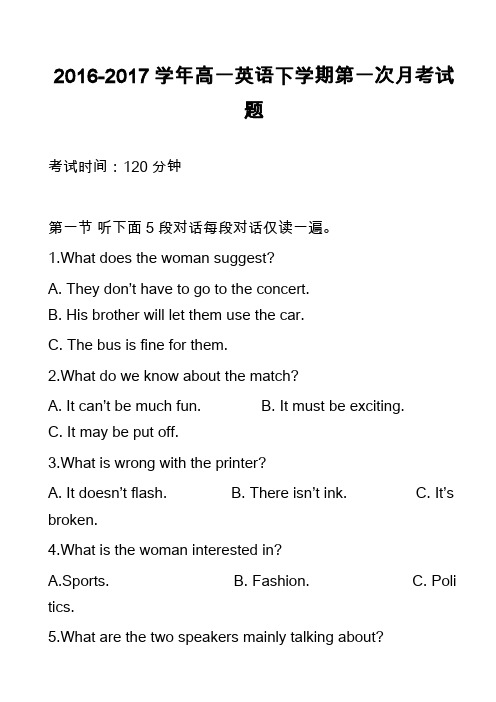
2016-2017学年高一英语下学期第一次月考试题考试时间:120分钟第一节听下面5段对话每段对话仅读一遍。
1.What does the woman suggest?A. They don’t have to go to the concert.B. His brother will let them use the car.C. The bus is fine for them.2.What do we know about the match?A. It can’t be much fun.B. It must be exciting.C. It may be put off.3.What is wrong with the printer?A. It doesn’t flash.B. There isn’t ink.C. It’s broken.4.What is the woman interested in?A.Sports.B. Fashion.C. Poli tics.5.What are the two speakers mainly talking about?A. New dictionaries.B. Language forms.C. The development of languages.第二节(共15小题)听下面5段对话或独白。
听第6段材料,回答第6至7题。
6.What’s wrong with the man?A. He is very tired and sleepy.B. He is worried abouthis text.C. He is ill because of hard work.7.What did the man do last night?A. He studied in the library.B. He went to a party.C. He prepared for a big text.听第7段材料,回答第8至10题。
高中英语真题:2016---2017学年高一英语下学期第一次月考试卷

2016---2017学年高一英语下学期第一次月考试卷(考试时间:120分钟总分:150分)第I卷(共94分)第一部分:听力(共两节,满分30分)做题时,先将答案标在试卷上。
录音内容结束后,你将有两分钟的时间将试卷上的答案转涂到答题卡上。
第一节(共5小题;每小题1.5分,满分7.5分)听下面5段对话,每段对话后有一个小题。
从题中所给的A,B,C三个选项中选出最佳选项,并标在试卷的相应位置。
听完每段对话后,你都有10秒钟的时间来回答有关小题和阅读下一小题。
每段对话仅读一遍。
例:How much is the shirt?A. £19.15B. £9.15.C. £9.18.答案是B。
1. What will Dorothy do on the weekend?A. Go out with her friend.B.Make some plans.C.Work on her paper.2. What was the normal price of the T-shirt?A. $15.B. $30.C. $50.3. What has the woman decided to do on Sunday afternoon?A. To attend a wedding.B. To visit an exhibition.C. To meeta friend.4. When does the bank close on Saturday?A. At l:00 pm.B. At 3:00 pm.C. At 4:00 pm.5. Where are the speakers?A. In a store.B. In a classroom.C. At a h otel.第二节(共15小题;每小题1.5分,满分22 .5分)听下面5段对话或独自。
每段对话或独白后有几个小题,从题中所给的A、B、C三个选项中选出最佳选项,并标在试卷的相应位置。
高一英语下学期第一次月考试题(PDF,无答案)
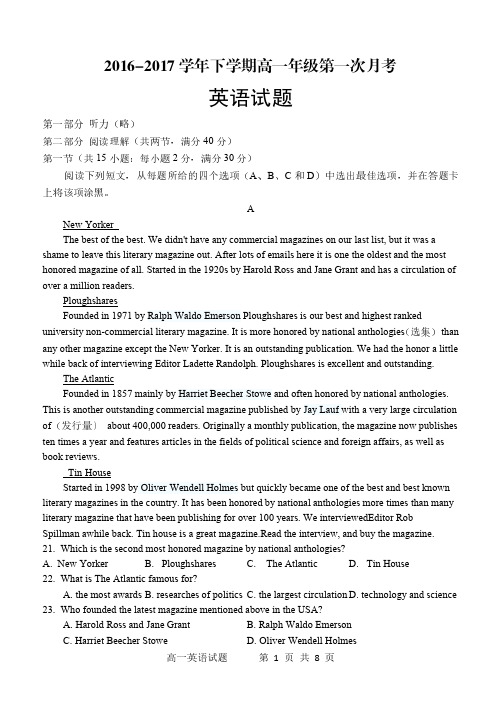
2016-2017学年下学期高一年级第一次月考英语试题第一部分听力(略)第二部分阅读理解(共两节,满分40分)第一节(共15小题:每小题2分,满分30分)阅读下列短文,从每题所给的四个选项(A、B、C和D)中选出最佳选项,并在答题卡上将该项涂黑。
A22.What is The Atlantic famous for?A.the most awardsB.researches of politicsC.the largest circulationD.technology and science23.Who founded the latest magazine mentioned above in the USA?A.Harold Ross and Jane GrantB.Ralph Waldo EmersonC.Harriet Beecher StoweD.Oliver Wendell Holmes24.What can we infer about from the magazines mentioned in the test?A.They all have a long history.B.They all belong to literary magazines.C.They are all most popular magazines.D.They are published by a company.BProfessor Carl Jones won the2016Indianapolis Prize--the highest honor inthe field of animal conservation--for his40years of work in Mauritius,where he saved an endangered kestrel(a kind of bird)from becoming the next Dodo.When the61-year-old first travelled to the east African island in the1970s he was told to close down a project to save the Mauritius kestrel.At the time there were just four left in the wild,making it the rarest bird on Earth.However he stayed,performing the controversial techniques of captive breeding(圈养繁殖)and a technique known as‘double-clutching’,which included taking eggs from the birds’nests and hatching them under incubators(孵卵器),motivating the mothers to lay another set of eggs in the wild.A decade later,the number of Mauritius kestrels had soared to over300and today there are around400in the wild.Reflecting on the start of his career,he said the Mauritius kestrel project had been seen as a “dead loss”at the time.In the1970s there was fierce opposition to the captive breeding techniques,with critics(批评者) arguing that they were too risky and took the emphasis off breeding in the wild.“As a young man in my20s,I certainly didn’t enjoy the stress and the tension of the criticism I received,”Prof Jones,who now lives in Llanwrda,Powys,said.He said receiving the prize was particularly important to him because it showed his work to save birds was reasonable,whereas previous winners have tended to concentrate on more high profile(惹人注目的)species,like polar bears or elephants.Dr Lee Durrell,director for Durrell Wildlife Conservation Trust,said:“Carl is living proof that by having the courage,talent and vision to take small steps,we can win victories for species largeand small.”25.What can we learn about Dodo?A.It is a kind of endangered bird.B.It is a rare species of bird alive.C.It no longer exists in the world.D.It is saved by Professor Carl Jones.26.Why did Professor Carl Jones take eggs from the birds’nests?A.To do some research on the eggs.B.To find out if man can hatch them.C.To protect them from becoming bad.D.To stimulate the males to lay more eggs.27.Which of the following can replace the underlined word“soared”in Paragraph4?A.increasedB.registeredC.gatheredD.survived28.What is the difference between Carl and previous winners?A.He used unique techniques.B.What he did was more valuable.C.He has more courage,talent and vision.D.The species he has saved was less striking.Most young Australians undertake unpaid work experience as part of their education or training, to maintain rights to social security,or simply to improve their job prospects.But those from more disadvantaged backgrounds are less likely to have those opportunities and those on placements(实习) associated with government benefits enjoy their experiences less.We also found that unpaid placements may involve significant costs for those who undertake them.The research,the first of its kind in this country,surveyed3800people aged18-64about work experience.It doesn't include volunteering,such as at a church,charity or club.Around half of all unpaid work experience occurred in connection with a formal course of a university or secondary schooling.This is unsurprising,given the emphasis that education providers and employers now place on work-combined learning.However,this means half of all arrangements occur outside of education or training courses.In our survey,people also completed unpaid work experience because:they were required to do so to maintain Youth Allowance or Newstart payments,they were part of an unpaid trial during a recruitment(招聘)process,it was unpaid training following an offer or employment,or for some other reason.Our research revealed a variety of costs associated with unpaid work experience.For example, over a quarter of respondents reduced their hours of paid employment in order to participate in unpaid work and20%organized and paid for their own insurance.These costs may mean some can afford to access this work experience while others can’t.More than one in ten respondents paid money to a broker,agent or directly to the host organization to take part and one in four had to travel longer than one hour to attend.Among the study participants,17%lived away from their usual home to participate.29.What can be inferred about unpaid work experience from the passage?A.The research about it covers a small scale.B.It offers the participants more social rights.C.Not all own the opportunities to undertake it.D.It is more popular among government officials.30.what is the main reason for participating in unpaid work experience?A.Part of an unpaid trial.B.Secondary work experience.C.Requirement of income support.D.Part of a higher education course.31.What is the main idea of the last two paragraphs?A.Costs of participating in unpaid work experience.B.Benefits of participating in unpaid work experience.C.How to find a suitable job with unpaid work experience.D.The reason for being satisfied with unpaid work experience.Both Visiting Day and Knock Knock,which won a2014Coretta Scott King Award,describe black families torn apart by a father’s imprisonment,but their similarities end there.In Visiting Day we see a family that still sees itself as a family.In Knock Knock,circumstances are harder to understand—just as they would be for a young child.The boy at the center of Knock Knock begins the book by telling us of a game he and his father share:Every morning his father knocks on his bedroom door,and he pretends to be asleep until his father is beside his bed.Then he“jumps into his arms.”But one morning,the boy’s father isn’t there. The boy doesn’t know why,and we are left to guess the reason,and to read the boy’s letters to his absent father.After a long time,the boy’s father writes back.“No longer will I be there to knock on your door,”he tells his son,“so you must learn to knock for yourself.Knock knock down the doors that I could not…Knock knock for me,for as long as you become your best.”The book ends with father and son reunited,but only after the boy we saw at the beginning of the book has grown into a man. Knock Knock began its life not as a children’s book but as a monologue(长篇独白),inspired by author Daniel Beaty’s own experience of his father’s imprisonment,which began when Beaty was three years old.Visiting Day is a similarly personal story for its author,Jacqueline Woodson,and its illustrator(插图画家),James E.Ransome.Ransome had previously kept the“family secret”of his brother’s imprisonment,and Woodson grew up visiting her favorite uncle in prison.32.What is the similarity between Visiting Day and Knock Knock?A.Won similar prizes.B.Describe similar families.C.Situations are harder to understandD.Discuss how to avoid crimes on families.33.Why was the father absent from their daily game with his son?A.He was too busy to spare time.B.He is playing a game with his son.C.He went to prison for some reason.D.He let him to learn to be independent.34.What are Visiting Day and Knock Knock based on?A.The authors’personal experience.B.The stories told by the illustrator.C.Monologues that passers-by delivered.D.The documents offered by a uncle in prison.35.What is most likely to be discussed in the paragraph that follows?A.Ransome’s brother.B.The book Visiting Day.C.The stories of Daniel Beaty.D.A visit to Woodson’s favorite uncle.第二节(共5小题,每小题2分,满分10分)根据短文内容,从短文后的选项中选出能填入空白处的最佳选项,选项中有两项为多余选项。
2016届高一年级下学期第一次月考英语试卷

上饶县中学2016届高一年级下学期第一次月考英语试卷第I卷(三部分,共115分)第一部分:听力理解(共两节,30分)第一节(共5小题;每小题1.5分,满分7.5分)听下面5段对话。
每段对话后有一道小题,从每题所给的A、B、C三个选项中选出最佳选项。
听完每段对话后,你将有10秒钟的时间来回答有关小题和阅读下一小题。
每段对话你将听一遍。
1. How will the man go to the park?A. By bus.B. By bike.C. On foot.2. What will the man do first this evening?A. Go to the cinema.B. Call on his friends.C. Go for a walk.3. What does Betty like collecting?A. Stamps.B. Coins.C. Cards.4. Where does the conversation probably take place?A. In a store.B. In a hotel.C. In a restaurant.5. What is the conversation mainly about?A. A film star.B. A book.C. A picture.第二节(共15小题;每小题1.5分,满分22.5分)听下面5段对话或独白,每段对话或独白后有几个小题,从题中所给的A、B、C三个选项中选出最佳选项,并标在试卷的相应位置。
听每段对话或独白前,你将有时间阅读各个小题,每小题5秒钟;听完后,每个小题将给出5秒钟的作答时间。
每段对话或独白读两遍。
请听第6段材料,回答第6—7题。
6. What’s wrong with the woman?A. She has a headache.B. She has a toothache.C. She has a stomachache.7. What day is it today?A. Tuesday.B. Wednesday.C. Thursday.请听第7段材料,回答第8—9题。
2016-2017学年高一英语下学期第一次月考试卷
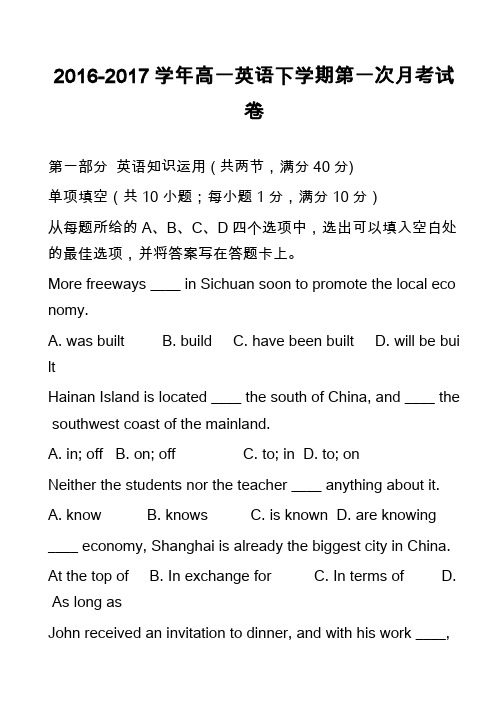
2016-2017学年高一英语下学期第一次月考试卷第一部分英语知识运用 ( 共两节,满分40分)单项填空(共10 小题;每小题1分,满分10分)从每题所给的A、B、C、D四个选项中,选出可以填入空白处的最佳选项,并将答案写在答题卡上。
More freeways ____ in Sichuan soon to promote the local eco nomy.A. was builtB. buildC. have been builtD. will be bui ltHainan Island is located ____ the south of China, and ____ the southwest coast of the mainland.A. in; offB. on; offC. to; inD. to; onNeither the students nor the teacher ____ anything about it. A. know B. knows C. is known D. are knowing____ economy, Shanghai is already the biggest city in China. At the top of B. In exchange for C. In terms of D. As long asJohn received an invitation to dinner, and with his work ____,he gladly accepted it.A. finishedB. finishingC. having finishedD. was finished6. From their ____ on the top of the TV Tower, visitors can ha ve a better view of the city.A. stateB. positionC. conditionD. situa tionThe new stadium being built for the next Olympic Games will be ____ the present one.A. 3 times as big asB. as 3 times big asC. 3 times bigger a sD. bigger than 3 timesI do every single bit of housework, ____ my husband Bob just washes dishes sometimes.A. asB. whileC. whenD. althoughCoal is ____ to the development of industry.A. much importanceB. an importanceC. of great importanceD. of importantIt is amazing that the little boy can go ____ the forest ____ 100 miles long.A. across; measuringB. over; measuredC. across; measureD. through; measuring完形填空(共15小题;每小题2分,满分30分)阅读下面短文,掌握其大意,然后从各题所给的A、B、C、D 四个选项中选出可以填入空白处的最佳选项。
高中英语真题:2016-2017学年高一英语下学期第一次月考试题(无答案)_2

2016-2017学年高一英语下学期第一次月考试题(无答案)第一部分:听力(共30分)(共5小题;每小题1.5分)请听下面5段对话,选出最佳选项。
1.How is the man most probably feeling now?A. SadB.frightenedC. Excited2.Where does the conversation probably take place?A. In a hotel.B. In a laboratoryC. In a library3.What does the woman probably do?A. A driverB. A doctorC. A policewoman4.Why is the man going to Nigeria?A. To work.B. To study.C. To relax5. What’s the possible relationship between the two speakers ?A. Teacher and student.B. Boss and secretary.C. Husband and wife(共15小题;每小题1.5分)请听下面5段对话或独白,选出最佳选项。
请听第6段材料,回答第6至7题。
What’s the matter with the man?A. He burnt his fingerB. He cut his fingerC. He burnt hi s footWhere can the woman find some band--aids?A. In the bedroomB. In the dining room.C. In the bathr oom请听第7段材料,回答第8至9题。
What kind of music does the woman like?A. JazzB. Country musicC. Rock an d rollWho is the man’s favorite singer?A. Carleton CarpenterB. John DenverC. Michael Jack son请听第8段材料,回答第10至12题What does the woman think of her life in New York?A. Just so-so B. Quite satisfactory C. A bit disappointing.What does the woman say about Henry?A. A bit heavierB. Much youngerC. More elegant Which of the following does the man like?A. Boiled eggs.B. Roast duckC. Fried eggplants请听第9段材料,回答第13至16题。
高中英语真题:2016-2017学年高一英语下学期第一次月考试题_10

2016-2017学年高一英语下学期第一次月考试题本试卷分第Ⅰ卷(选择题)和第Ⅱ卷(非选择题)两部分,共6页。
考试结束后,将答题卡交回。
注意事项:1. 答题前,考生先将自己的姓名、准考证号填写清楚,将条形码准确粘贴在考生信息条形码粘贴区。
2.选择题必须使用2B铅笔填涂;非选择题必须使用0.5毫米黑色字迹的签字笔书写,字体工整、笔迹清楚。
3.请按照题号顺序在各题目的答题区域内作答,超出答题区域书写的答案无效;在草稿纸、试题卷上答题无效。
4.作图可先使用铅笔画出,确定后必须用黑色字迹的签字笔描黑。
5. 保持卡面清洁,不要折叠,不要弄破、弄皱,不准使用涂改液、修正带、刮纸刀。
第Ⅰ卷第一部分:听力(共20小题,满分 30 分)第一节:(共5小题;每小题1.5分,满分7.5分)听下面5段对话。
每段对话后有一小题,从题中所给的A,B,C 三个选项选出最佳答案。
每段对话仅读一遍。
What does the man usually have for breakfast?Fried rice noodles. B. Fried cakes.C. Noodles.What will the woman do first?Withdraw some money. B. Go to the history class.C. See the dentistHow much will the man pay if he buys four ties? $108 B. $120C. $117What does the woman mean?She forgot to fill out the forms.She’ll remind the man about the forms.Filling out the forms is no easy thing to do.What is the conversation mainly about?Preference of vegetables over fruits.Different ideas about meat.The woman’s diet habits.第二节(共15小题;每小题1.5分,满分22.5分)听下面5段对话或独白。
江西省上饶市横峰中学2011高一英语下学期第一次月考试题【会员独享】

江西省上饶市横峰中学2011-2012学年高一英语下学期第一次月考试题第一部分:听力(共两节,满分30分)第一节(共5小题;每小题1.5分,满分7.5分)请听下面5段对话,选出最佳选项。
1. What will the man do?A. Open the window.B. Find another room.C. Go out with the woman.2. What’s the date of the woman’s birthday?A. March 15th.B. March 11th.C. March 7th.3. What does the man mean?A. John has some personal problems.B. The problem is common for young men.C. It’s not common for young men to leave home.4. What will the man most probably do?A. Get some change from JaneB. Go and look for a payphone.C. Use Jane’s mobile phone.5. What does the man mean?A. It was impossible for him to go to the party.B. Everybody was surprised by his appearance at the party.C. He had expected to go to the party for a long time.第二节(共15小题;每小题1.5分,满分22.5分)。
请听第6段材料,回答第6至8题。
6. Why does the woman want to go to the library?A. To return some books.B. To borrow some new books.C. To find some test papers.7. When does the library close?A. At 9:00.B. At 9:40.C. At 10:00.8. What does the man ask the woman to do?A. He asks her to return some books for him.B. He asks her to borrow some books for him.C. He asks her to go to the library with him.请听第7段材料,回答第9至11题。
高中英语真题:2016-2017学年高一英语下学期第一次月考试题_11

2016-2017学年高一英语下学期第一次月考试题第Ⅰ卷第一部分:听力(共两节,满分30分)第一节:(共5小题;每小题1.5分, 满分7.5分)听下面5段对话。
每段对话后有一个小题,从题中所给的A、B、C三个选项中选出最佳选项,并标在试卷的相应位置。
听完每段对话后,你都有10秒钟的时间来回答有关小题和阅读下一小题。
每段对话仅读一遍。
1. Where are the speakers probably?A. In the kitchen.B. On the sports groundC. In the library .2. What happened to the man this morning?A. He was late.B. He got fired.C. His clock was broken.3. What’s the man’s job?A. A shop assistant.B. A tailor.C. A salesman.4. Where should be the most suitable place for this conversati on.A. At the hospitalB. At the woman’s home.C. In the teacher’s office.5. What are the speakers talking about?A. Exam results.B. The time for the exam.C. The chan ge of class hours.第二节(共15小题:每小题1.5分,满分22.5分)听下面5段对话或独白。
每段对话或独白后有几个小题,从题中所给的A、B、C三个选项中选出最佳选项,并标在试卷的相应位置。
听每段对话或独白前,你将有时间阅读各个小题,每小题5秒钟;听完后,个小题将给出5秒钟的作答时间。
每段对话或独白读两遍。
高一英语下学期第一次考试试题word版本

2016—2017学年度第二学期高一第一次考试英语试卷满分:150分考试时间:120分钟第I卷第一部分听力(共两节,满分30分)做题时,先将答案标在试卷上。
录音内容结束后,你将有两分钟的时间将试卷上的答案转涂到答题卡上。
第一节(共5小题;每小题1.5分,满分7.5分)听下面5段对话。
每段对话后有一个小题,从题中所给的A、B、C三个选项中选出最佳选项,并标在试卷的相应位置。
听完每段对话后,你都有10称钟的时间来回答有关小题如阅读下一小题。
每段对话仅读一遍。
1. What will the woman probably do this evening?A. Attend a lecture.B. Go skating.C. Visit Lisa.2. What are the speakers talking about?A. A hotel.B. A church.C. A storm.3. What does the woman suggest the man do?A. Call George.B. Cancel his meeting.C. Have class first.4. What will the man buy?A. Carrots.B. Potatoes.C. Onions.5. When will the next movie begin?A. At 6:00 pm.B. At 7:00 pm.C. At 7:30 pm. 第二节(共15小题;每小题1.5分,满分22.5分)听下面5段对话或独白。
每段对话或独白后有几个小题,从题中所给的A、B、C三个选项中选出最佳选项,并标在试卷的相应位置。
每段对话或独白读两遍。
6. What present did the woman get?A.A bag.B. A T-shirt.C. A book.7. Who got a DVD as a present?A. The man’s dad.B. The man’s granddad.C. The man’s brother.请听第7段材料,回答第8、9题。
- 1、下载文档前请自行甄别文档内容的完整性,平台不提供额外的编辑、内容补充、找答案等附加服务。
- 2、"仅部分预览"的文档,不可在线预览部分如存在完整性等问题,可反馈申请退款(可完整预览的文档不适用该条件!)。
- 3、如文档侵犯您的权益,请联系客服反馈,我们会尽快为您处理(人工客服工作时间:9:00-18:30)。
江西省上饶市横峰县2016-2017学年高一英语下学期第一次月考试题考试时间:120分钟第一部分听力(共两节,满分30分)第一节(共5小题;每小题分,满分分)does the man need?water. medicine. water cups.did this conversation take place?the hospital. the airport. the post office.are the speakers talking about?child. room. present.can we learn from this conversation?woman does not get along well with the man.woman does not get along well with her roommate.man will talk with the woman’s roommate.does the woman ask the man to do?her what the problem is.the computer for her.someone to help her.第二节 (共15小题;每小题分,满分分)听第6段材料,回答第6至8题。
does the man call the woman for?invite her to a dinner. get some suggestions.fix a date.which day will the woman come to the man’s house?Sunday. Friday. Saturday.will the man go to New Zealand?one week. a couple of months. two weeks.听第7段材料,回答第9至11题。
are the speakers going?the football field. the sports meeting.the swimming pool.do we know about the stadium?is being built. has been done already.can be used to park buses.does the woman do?English teacher. tour guide. bus driver.听第8段材料,回答第12至14题。
is the woman?writer. tourist. reporter.does the man expect the woman to finish the assignment?Friday. Wednesday. Thursday.can we learn from the dialogue?Dubai is the tallest building in the world.is a city in Western Europe.woman is just back from a trip to Dubai City.听第9段材料,回答第15至17题。
do we know about Nancy?has an unhappy marriage. has broken up with her husband. will take her daughter to her parents.will happen to Bonnie?will be with her father. will be with her mother.will be with her grandfather.will Nancy’s parents do for Nancy?her home immediately.with her not to break up with her husband.with her not to take the responsibility to be a single parent. 听第10段材料,回答第18至20题。
are the main characters of the science fiction book?group of soldiers. group of sailors. young people.and when does the romantic book set?China in the 1920s. China in the 1930s.England in the 1930s.type of book is the third book?biography. historical novel. sports novel.第二部分阅读理解(共两节,满分40分)第一节(共15小题;每小题2分,满分30分)AOne dark, windy night, a drunk was making his way home after the bar was closed. He got dead drunk and walked through a graveyard (墓地) instead of his usual way home.The wind was strong and he thought he could hear a voice calling his name. Suddenly, the ground opened up in front of him, and he fell down, down into an open grave! He could hear the voice more clearly now, calling him. He thought it was the devil (魔鬼) coming for him.The hole was very deep and the inside was black. His eyes became used to the darkness after a moment, and he saw something sitting in the darkness with him. It called his name, and he moved quickly in fear, trying to climb out of the hole. Then it spoke, “You can’t get out!”The drunk gave a shout of terrible fear and jumped up more than six feet. He managed to catch the edge of the hole with his hands, climbed out, and ran for home as fast as he could.Inside the open grave, his neighbor Charlie felt very sad. He had fallen into the hole a few minutes before his neighbor. He had thought that they might be able to help each other climb out. Now he was going to have to wait until the next morning and ask someo ne to bring him a ladder.21. Why didn’t the man go the usual way home?A. It was dark and windy.B. The bar closed late.C. He was drunk.D. He was looking for Charlie.22. The drunken man gave a shout of terrible fear because _______.A. he was afraid of darknessB. he thought he saw the devilC. the person in the grave hit himD. he thought he would never get out23. What can we infer from the passage?A. Charlie pulled the man into the hole.B. The drunken man ran home for ladders.C. The drunken man didn’t recognize his neighbor.D. Charlie also got drunk.BIt seems that people are gradually losing their smartness as smart phones become increasingly important assistants in their lives. As we rely too much on technology instead of our brains, many people have lost three basic abilities.The first skill many people have lost is remembering phone numbers. Because phone numbers are stored in smart phone contacts, there's now no need to dial a number or look at it again. This is fine until you need to call someone for help only to find you r phone is not around.And some people may also have lost their sense of direction because some apps can guide people anywhere they want. People get so dependent on them that when they can't use their smart phones, they get lost and anxi ous.But the worst lost skills may be social ones, meaning that some people are becoming sociall y disabled. People often bury themselves in their smart phones. As we're too absent- minded by what's happening in the virtual some of us have lost conversational skills and sometimes can't even tell whether a person is happy or not.Last August, researchers at the University of California, Los Angeles, studied 51 students aged 11 and 12 who had over five hours' screen time every day. Their task was to tell the emotions of 48 pictures of faces that were happy, sad, angry or scared.The children made an average of mistakes at the beginning. But after a five-day camp without electronic products, they made only mistakes on average.Luckily, people still have a chance to get these abilities back. You should try to keep your parents' numbers in mind for emergencies. You should also pay more attention to street signs and stores, which will help you to draw a mind map and stop you from getting lost. And the easiest solution to social skill loss is to take a break from electronic products.24. The underlined sentence in the second paragraph implies that .A. you are able to turn to others for helpB. you are unable to contact others without your smart phoneC. others are unable to get in touch with you by smart phoneD. others are able to call you anytime and anywhere25. The experiment shows that without electronic products, one could .A. tell more pictures of faces easilyB. lose the sense of direction frequentlyC. tell different emotions immediatelyD. recognize more facial expressions correctly26. Overusing smart phones, people will probably .A. lose face-to-face communication skillsB. have no sense of numbersC. fail to find their destinationD. weaken their senses of hearing and sight27. What's the writer's attitude towards electronic products?A. objectiveB. supportiveC. criticalD. OptimisticCThese are instructions for making invisible ink using baking soda.Difficulty: EasyTime required: A few minutesWhat you need:Baking soda Paper Water Light bulbPaintbrush Measuring cup Purple grape juiceHere’s how:There are at least two methods of using baking soda as invisible ink. Mix equal amounts of water and baking soda. Use a paintbrush to write a message onto white paper, using the baking soda solution (溶液) as “ink”. Allow the ink to dry.One way to read the message is to hold the paper up to a heat source, such as a light bulb. The baking soda will cause the writing in the paper to turn brown.The second way to read the message is to paint over the paper with purple grape juice. The message will appear in a different color.Tips:If you are using the heating method, avoid igniting (点燃) the paper.Baking soda and grape juice react with each other in an acid-base (酸碱) reaction, producing a color change in the paper. Grape juice concentrate (浓缩物) results in a more visible color change than regular grape juice.28. ______ is not needed for making invisible ink.A. Baking sodaB. PaperC. WaterD. Ink29. What’s the functio n of the paintbrush?A. To write a message onto the white paper.B. To draw a picture.C. To allow the “ink” to appear.D. To help the “ink” dry.30. Why will the message appear in a different color in the second way to read the message?A. Because there is enough grape juice.B. Because of the special paper.C. Because of the use of water.D. Because baking soda reacts with grape juice.31. From the process, we can know that making invisible ink is ______.A. very hardB. a little difficultC. not difficultD. not easyDSupper was not going well for two-year-old Benjamin. As his fru strations escalated to the brink of a full-on tantrum, his 4-year-old sister, Ellie, assessed the scene. "He's angry," she told her mother, Susan Rivers, of Newton, Massachusetts. "What can we do to make him happy?" With her mom's help, Ellie brainstormed a few options. Perhaps they could offer Benjamin a cookie. Or maybe playing with his Legos would bring him out of his spiral. "She was really trying to understand his feelings and figure out what strategies she could use to reduce his frustration and cheer him up," Rivers says. Ellie's concern for her brother is touching, to be sure. But it could also be the key to her having a more joyful life.Empathy -- the ability to understand and be sensitive to other people's feelings -- helps us to be more deeply attached to our family, friends, and even strangers. "Empathy is probably the greatest single gift of our species," says Bruce D. Perry, ., ., a senior fellow at the Child Trauma Academy, in Houston, and the coauthor of Born for Love: Why Empathy Is Essential -- and Endangered. "We wouldn't have been able to survive withoutcreating relationships and groups that could function together."Putting yourself in someone else's shoes is also a crucial building block for other caring emotions. "It's how we develop thankfulness, hope, and sympathy(同情)-- which is the ability to act on your empathy," explains Christine Carter, ., a sociologist and happiness expert at the Greater Good Science Center at the University of California, Berkeley. One study there found that kids as young as 18 months could master a key component of empathy: the ability to tune in to people's emotions. By age 4, they move beyond making physical caring gestures and start to think about others' feelings in relation to their own. Many of these responses happen naturally, but you can make a more conscious effort to promote empathy-boosting experiences for your children. Consider these 11 things you can do to raise a truly caring child.32. The first paragraph serves as a(n) .A. explanationB. exampleC. commentD. conclusion33. In Paragraph 2, Bruce D. Perry .A. makes comments about Ellie’s concernB. stresses the importance of empathyC. shows his opinions about helping othersD. explains the meaning of empathy34. What would the author probably discuss in the paragraph that follows?A. Why empathy is so important.B. Why many people don’t have empathy.C. How to develop children’s empathy.D. How kids understand people’s feelings.35. For whom is the text most probably written?A. Students.B. Educators.C. Researchers.D. Parents.第二节(共5小题;每小题2分,满分10分)根据短文内容,从短文后的选项中选出能填入空白处的最佳选项。
